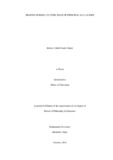
Please use this identifier to cite or link to this item:
https://hdl.handle.net/20.500.14301/107| Title: | SHAPING SCHOOL CULTURE: ROLE OF PRINCIPAL AS A LEADER |
| Authors: | Gharti, Bishwo Udhir Poudel |
| Citation: | Gharti, B. U. P.(2012). Shaping School Culture: Role of Principal as a Leader. [Unpublished Doctor of Philosophy Thesis]. Kathmandu University |
| Issue Date: | Oct-2012 |
| School: | SOED |
| Department: | DODE |
| Level: | Ph.D. |
| Program: | PhD in Development Education |
| Abstract: | The main purpose of this research was to find how Principal as a leader shapes the school culture. With more than 16 years of experience in six different schools and colleges the researcher noticed that school culture and Principal’s leadership vary from school to school. Hence this research was conducted to find Principal’s role in forming school culture. This qualitative research was conducted with interpretive paradigm and ethnography method. Three schools were chosen purposively of three different categories; government, trust based and private and from three different districts Laitpur, Kaski and Kathmandu respectively. The data was collected through observations, open interviews and document analysis. Qualitative data analysis software called ATLAS ti (6.2) was used to code the data generated. Themes were developed manually to answer the research questions. Findings of the study suggested that Principal’s effort to spread school vision beyond the school earned admiration from the society in return. Principal’s motivation through one’s own examples and efforts resulted in motivated and dedicated teachers. It was found that a friendly and humorous Principal gets students’ high attention and gains their respect forming positive culture. Principal’s humanistic approach and values through caring, understanding, friendly and polite behavior produced active and confident students revealing effective culture. Rituals and ceremonies like assembly rituals, events, sports, and festivals helped the students to learn practically revealing the effective school culture. Autocratic approach of Principal made teachers disappointed forming toxic culture. Students were found to be scared with an unfriendly and serious Principal revealing toxic school culture. Principal’s high vigilance resulted in formal culture. Lack of Principal’s approach for shared goals and proper reward system resulted in toxic culture. Principal show teachers their long-term growth and provide good remuneration to motivate them. The study concluded that Principal’s high social cohesion, personal consideration, friendly, humorous, caring and understanding behaviors result in homely school culture. Similarly his/her importance to all round education, vision beyond school, one’s own effort and examples, desire for high achievement result in the achieving school culture. My study also found that high vigilance, contingent reward, and management by exception, high emphasis on values and enforcement of the programs from the Principal results in the official school culture. But when Principal is unfriendly and scary, lacks strong vision and values, has very low communication and lacks effective leadership, it results in futile school culture. In reality, schools have a dynamic mix of the four types of the school culture rather than possessing a single type exclusively. An appropriate combination of homely, achieving and official school cultures result in effective or positive end of the “School Culture Continuum”, whereas the domination of futile and official school cultures result in the toxic end of the continuum. |
| URI: | http://101.251.6.110:8080/handle/20.500.14301/107 |
| Appears in Collections: | Research Project |
Files in This Item:
| File | Description | Size | Format | |
|---|---|---|---|---|
| Bishwo Udhir Poudel Gharti, PhD.pdf | 2.73 MB | Adobe PDF |  View/Open |
Items in DSpace are protected by copyright, with all rights reserved, unless otherwise indicated.